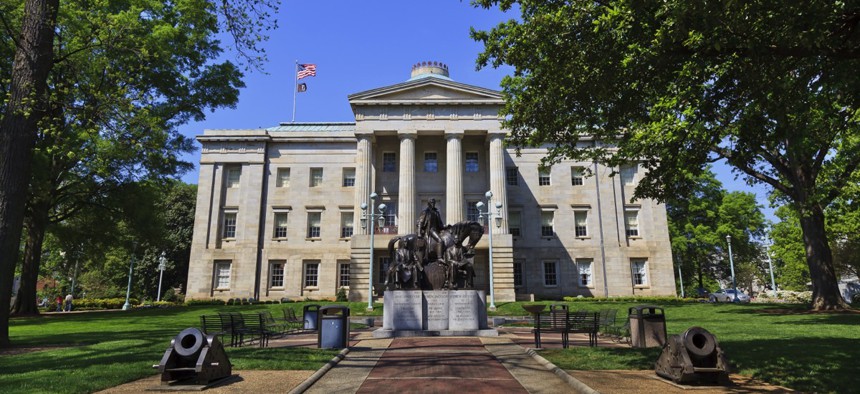Special Session for N.C.’s ‘Bathroom Bill’; FEMA Trailer Frustrations in Louisiana

Also in our State and Local Daily Digest: Minneapolis may defect from regional group; Barrow, Alaska, is no more; and a Sacramento-area park “ruined.”
STATE LEGISLATURES | After Charlotte’s city council voted on Monday to repeal its controversial local transgender bathroom ordinance, North Carolina Gov. Pat McCrory confirmed that there would be legislative special session to repeal House Bill 2. The state’s so-called “bathroom bill,” passed by the North Carolina General Assembly in an emergency session in March in response to Charlotte’s ordinance, prohibits transgender individuals from using public bathroom facilities of the gender they identify with—only the one stated on their birth certificate. The bill cost the state substantial sums as businesses, conferences, and sporting events shunned the state in the wake of its passage last year. “Full repeal will help to bring jobs, sports and entertainment events back and will provide the opportunity for strong LGBT protections in our state,” Gov.-elect Roy Cooper said in a statement. [WTVD-TV; The Charlotte Observer]
DISASTER RECOVERY | Many residents in southern Louisiana who were impacted by this summer’s devastating flooding and are eligible for a mobile homes provided by the Federal Emergency Management Agency are annoyed with the slow rollout of the temporary housing. There are 2,550 families who are eligible for the mobile homes who have not received one yet. FEMA says the remainder should be housed by Jan. 31. [The Advocate]
ECONOMIC DEVELOPMENT | Some leaders in Minneapolis want to cut ties with the Greater MSP regional economic development group after already withholding most of the city’s funding from the multi-jurisdictional organization. Some Greater MSP representatives from Minneapolis feel the city, the largest in Minnesota, is not benefiting much from its membership and the organization pits local governments against one another when it comes to business development tax incentives. [Star Tribune]
CITY HALLS | Next month, Charlie Hales will become Portland, Oregon’s third consecutive mayor to leave office after one term. Hales embraced a “Mr. Fix It” persona. But there has been plenty of tension and tumultuousness during his time in office. The Oregonian has a thorough roundup of his term. [Oregonian / OregonLive]
In other mayoral news, Bill Peduto is running for re-election in Pittsburgh. [Pittsburgh City Paper]
PARKS | Illegal camping, drug use and dumped trash are causing troubles in Sacramento’s Del Paso Regional Park—a 145-acre stretch of land. Workers removed 111 tons of garbage from the park over a recent six month period. “It’s beautiful out there,” said Michele Cable a board member with the local Horsemen’s Association. “There isn’t much open space left in Sacramento. It’s something we should preserve, and it’s getting ruined.” [The Sacramento Bee]
RELIGION | Local governments across the country are increasingly relying on zoning laws to prevent the building of new mosques and Islamic schools, part of what many see as a trend of growing intolerance. In Basking Ridge, New Jersey, for example, a mosque construction project years in the making was stymied when the town’s planning board rejected the proposal based on issues like stormwater management and pedestrian safety—after 39 public hearings. In response, the federal government is turning to the courts. [The New York Times]
MARIJUANA | An obscure but painful reaction to heavy marijuana use is cropping up more frequently in hospitals and clinics around the U.S. Known as cannabinoid hyperemesis syndrome, the condition manifests itself with cycles of violent vomiting and abdominal pain. “You can think of it as a new or emerging disease,” said Dr. Eric Lavonas, chief of emergency medicine at Denver Health Medical Center. [Billings Gazette]
CITY NAMES | Barrow, a city of 4,400 residents on Alaska’s North Slope, has been officially renamed Utqiaġvik. The ordinance that ushered in the change passed in an October city election by just six votes. Pushback against the new name remains significant, and includes a lawsuit. “A lot of the older generation—the majority is against change but their first language was Inupiaq,” said Bernadette Fischer, a 33-year-old Utqiaġvik City Council member who supports the new name. [Alaska Dispatch News]
NEXT STORY: As More Women Drink, Some States Take Action





